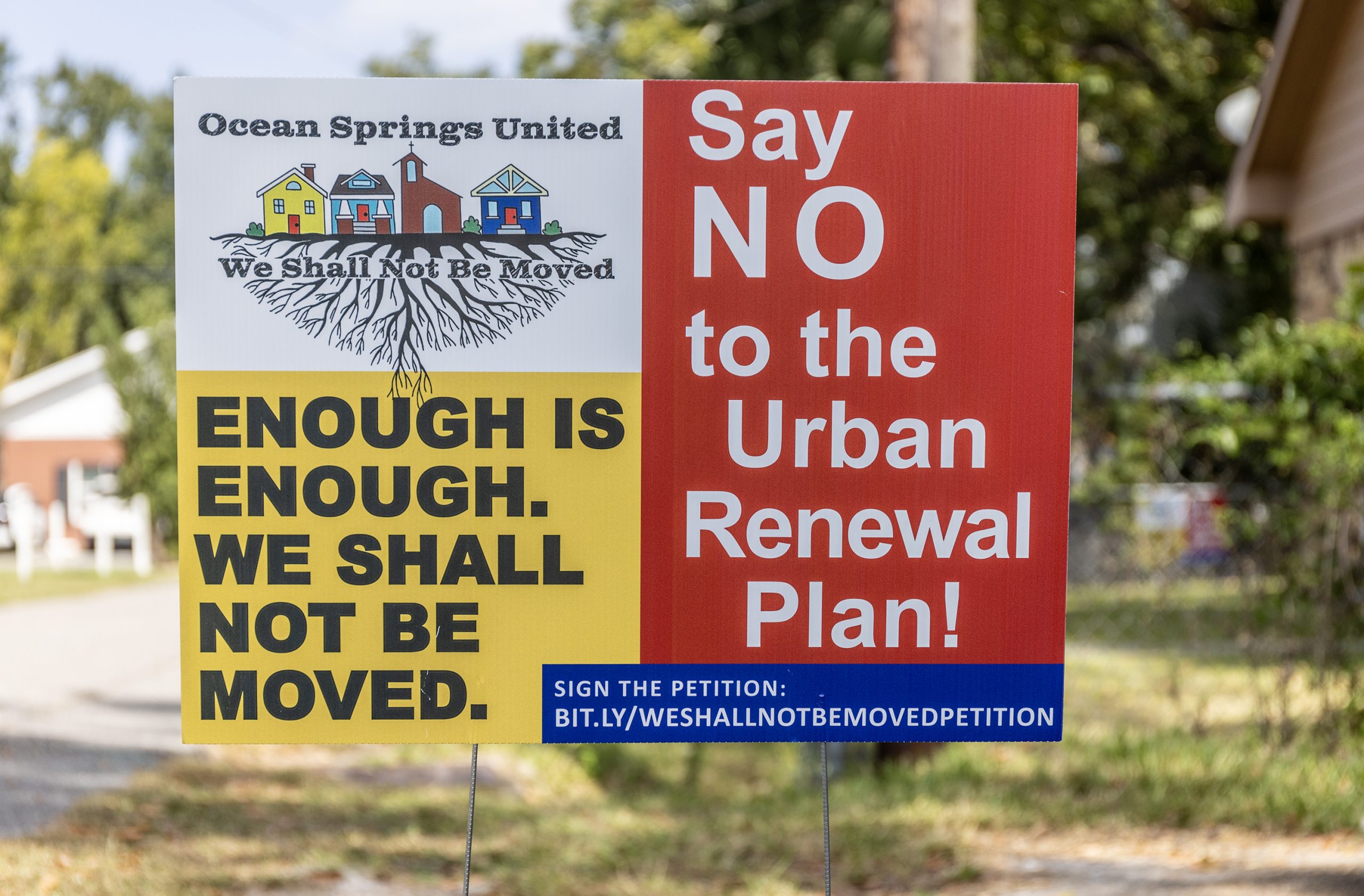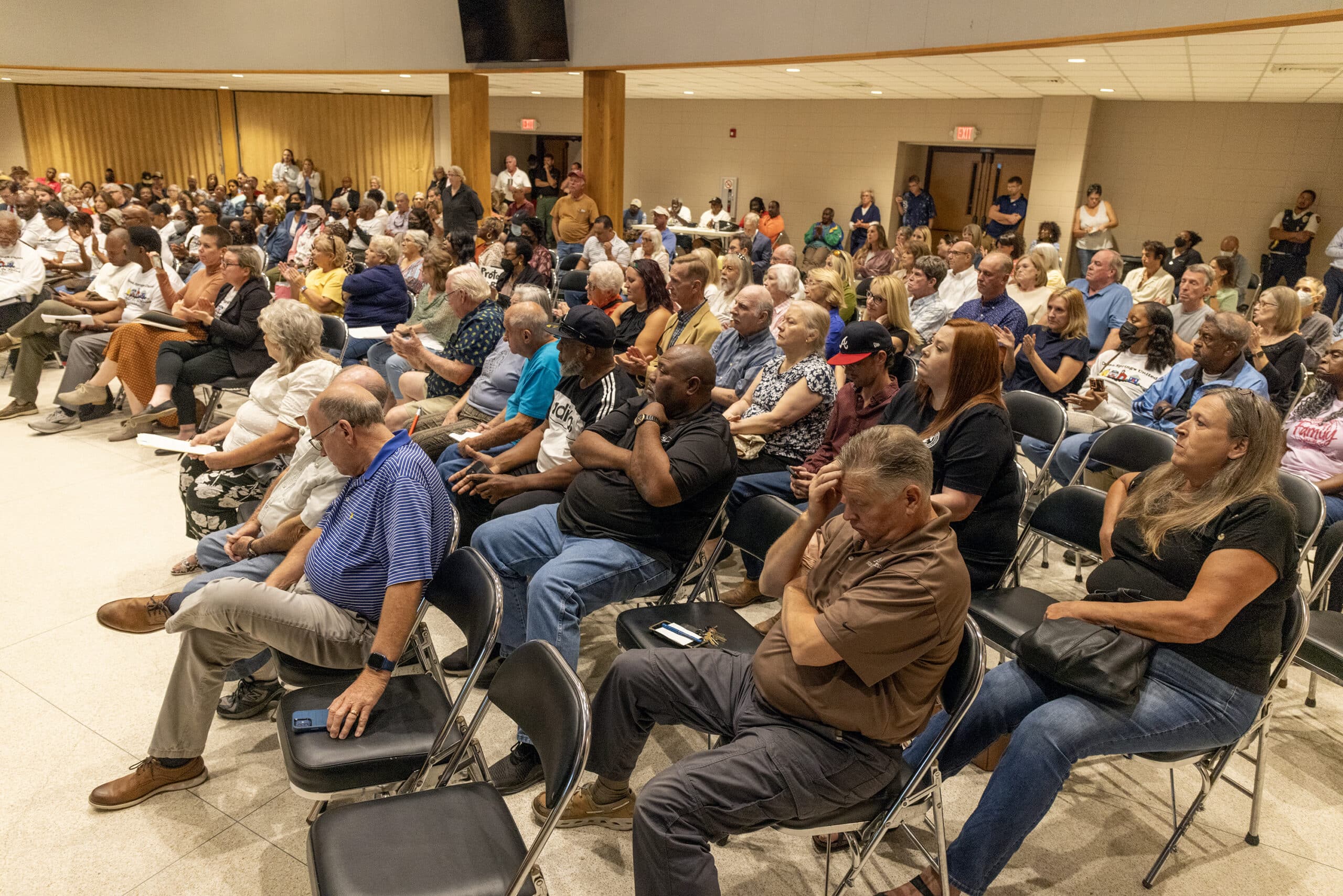Mississippi Today
Lawsuit challenges Mississippi’s urban renewal law being used on Ocean Springs homes


A group of Ocean Springs residents, a business owner and a church all filed a lawsuit in federal court against the city on Thursday over an urban renewal plan that labeled certain properties as “slums” or “blighted.”
In April, the city gave that designation to over 100 properties around Ocean Springs. By doing so, the city paved the way to invoke a state law that allows the acquisition of such properties — with or without the owners’ permission — in order to remove “economic and social liability.” While many of the properties listed in the urban renewal plan are vacant lots, they also include occupied homes, businesses and the parking lot of a church in a historic Black neighborhood.
But residents say they didn’t find out about the plan until the city shared it on social media before a board meeting in August. The state law, according to Thursday’s lawsuit, allows just 10 days for residents to contest a “blighted” designation, meaning that Ocean Springs property owners missed their chance to do so because they only found out about the plan months later.
The Institute for Justice, a nonprofit law firm from Virginia that specializes in eminent domain cases, is representing the plaintiffs. The lawsuit is not just going after the city of Ocean Springs, but Mississippi’s laws around urban renewal in general.

“Mississippi law says you have to challenge the ‘blight’ designation in 10 days,” said IJ attorney Dana Berliner. “And people were contacting us (about the urban renewal plan) long after that. That is a violation of due process.”
Specifically, the complaint asks for judgments declaring the city violated the property owners’ rights to due process, that the city’s urban renewal plan is invalid, and that the state’s laws around urban renewal are unconstitutional.
After pushback following the August city board meeting, Mayor Kenny Holloway has repeatedly stated that the city won’t forcibly acquire anyone’s property. Holloway, who according to his city bio owns a real estate and development company, said last week at a public comment session that the city could’ve done a better job of communicating the intentions of the urban renewal plan. He added that the idea was to use federal grants to help make improvements around Ocean Springs.

It’s unclear what the city’s next steps are now that it’s facing a federal lawsuit. Holloway told the Sun Herald after last week’s meeting: “We’re not going to stop the plan. We’re going to try to find some common ground and move forward.”
But even if the city doesn’t use the plan to acquire residents’ home, or even if the city scraps the plan altogether, harm has already been done to those property owners, Berliner explained.
“Even if the current administration does nothing like that, (the ‘blight’ label) is going to be there 20 years later,” she said.
According to the state law, she said, the owners have no way of removing the label after the 10-day period, which means a future administration could still acquire the “blighted” properties under a new urban renewal plan.
Ocean Springs residents whose properties have belonged to their families for generations argue that their homes and land don’t meet the criteria for “blighted” areas.
“We’re proud of our neighborhood, and while we may not have a lot of money to put in our homes, we keep them well,” homeowner Cynthia Fisher said. “What the city did, labeling our neighborhood as a slum without telling us, was wrong.”
Fisher is a plaintiff in the case along with homeowners Esther Payton and Edward Williams. Robert Zellner, who owns an auto repair store in the designated “blighted” area, and the Macedonia Missionary Baptist Church, which owns the aforementioned parking lot, are also plaintiffs. A link to the full complaint can be found here.
Mississippi Today is working on ongoing coverage of this story.
This article first appeared on Mississippi Today and is republished here under a Creative Commons license.
Did you miss our previous article…
https://www.biloxinewsevents.com/?p=295794
Mississippi Today
On this day in 1939, Billie Holiday recorded ‘Strange Fruit’

April 20, 1939

Legendary jazz singer Billie Holiday stepped into a Fifth Avenue studio and recorded “Strange Fruit,” a song written by Jewish civil rights activist Abel Meeropol, a high school English teacher upset about the lynchings of Black Americans — more than 6,400 between 1865 and 1950.
Meeropol and his wife had adopted the sons of Julius and Ethel Rosenberg, who were orphaned after their parents’ executions for espionage.
Holiday was drawn to the song, which reminded her of her father, who died when a hospital refused to treat him because he was Black. Weeks earlier, she had sung it for the first time at the Café Society in New York City. When she finished, she didn’t hear a sound.
“Then a lone person began to clap nervously,” she wrote in her memoir. “Then suddenly everybody was clapping.”
The song sold more than a million copies, and jazz writer Leonard Feather called it “the first significant protest in words and music, the first unmuted cry against racism.”
After her 1959 death, both she and the song went into the Grammy Hall of Fame, Time magazine called “Strange Fruit” the song of the century, and the British music publication Q included it among “10 songs that actually changed the world.”
David Margolick traces the tune’s journey through history in his book, “Strange Fruit: Billie Holiday and the Biography of a Song.” Andra Day won a Golden Globe for her portrayal of Holiday in the film, “The United States vs. Billie Holiday.”
This article first appeared on Mississippi Today and is republished here under a Creative Commons Attribution-NoDerivatives 4.0 International License.![]()
Mississippi Today
Mississippians are asked to vote more often than people in most other states

Not long after many Mississippi families celebrate Easter, they will be returning to the polls to vote in municipal party runoff elections.
The party runoff is April 22.
A year does not pass when there is not a significant election in the state. Mississippians have the opportunity to go to the polls more than voters in most — if not all — states.
In Mississippi, do not worry if your candidate loses because odds are it will not be long before you get to pick another candidate and vote in another election.
Mississippians go to the polls so much because it is one of only five states nationwide where the elections for governor and other statewide and local offices are held in odd years. In Mississippi, Kentucky and Louisiana, the election for governor and other statewide posts are held the year after the federal midterm elections. For those who might be confused by all the election lingo, the federal midterms are the elections held two years after the presidential election. All 435 members of the U.S. House and one-third of the membership of the U.S. Senate are up for election during every midterm. In Mississippi, there also are important judicial elections that coincide with the federal midterms.
Then the following year after the midterms, Mississippians are asked to go back to the polls to elect a governor, the seven other statewide offices and various other local and district posts.
Two states — Virginia and New Jersey — are electing governors and other state and local officials this year, the year after the presidential election.
The elections in New Jersey and Virginia are normally viewed as a bellwether of how the incumbent president is doing since they are the first statewide elections after the presidential election that was held the previous year. The elections in Virginia and New Jersey, for example, were viewed as a bad omen in 2021 for then-President Joe Biden and the Democrats since the Republican in the swing state of Virginia won the Governor’s Mansion and the Democrats won a closer-than-expected election for governor in the blue state of New Jersey.
With the exception of Mississippi, Louisiana, Kentucky, Virginia and New Jersey, all other states elect most of their state officials such as governor, legislators and local officials during even years — either to coincide with the federal midterms or the presidential elections.
And in Mississippi, to ensure that the democratic process is never too far out of sight and mind, most of the state’s roughly 300 municipalities hold elections in the other odd year of the four-year election cycle — this year.
The municipal election impacts many though not all Mississippians. Country dwellers will have no reason to go to the polls this year except for a few special elections. But in most Mississippi municipalities, the offices for mayor and city council/board of aldermen are up for election this year.
Jackson, the state’s largest and capital city, has perhaps the most high profile runoff election in which state Sen. John Horhn is challenging incumbent Mayor Chokwe Antar Lumumba in the Democratic primary.
Mississippi has been electing its governors in odd years for a long time. The 1890 Mississippi Constitution set the election for governor for 1895 and “every four years thereafter.”
There is an argument that the constant elections in Mississippi wears out voters, creating apathy resulting in lower voter turnout compared to some other states.
Turnout in presidential elections is normally lower in Mississippi than the nation as a whole. In 2024, despite the strong support for Republican Donald Trump in the state, 57.5% of registered voters went to the polls in Mississippi compared to the national average of 64%, according to the United States Elections Project.
In addition, Mississippi Today political reporter Taylor Vance theorizes that the odd year elections for state and local officials prolonged the political control for Mississippi Democrats. By 1948, Mississippians had started to vote for a candidate other than the Democrat for president. Mississippians began to vote for other candidates — first third party candidates and then Republicans — because of the national Democratic Party’s support of civil rights.
But because state elections were in odd years, it was easier for Mississippi Democrats to distance themselves from the national Democrats who were not on the ballot and win in state and local races.
In the modern Mississippi political environment, though, Republicans win most years — odd or even, state or federal elections. But Democrats will fare better this year in municipal elections than they do in most other contests in Mississippi, where the elections come fast and often.
This article first appeared on Mississippi Today and is republished here under a Creative Commons Attribution-NoDerivatives 4.0 International License.
Mississippi Today
On this day in 1977, Alex Haley awarded Pulitzer for ‘Roots’

April 19, 1977

Alex Haley was awarded a special Pulitzer Prize for “Roots,” which was also adapted for television.
Network executives worried that the depiction of the brutality of the slave experience might scare away viewers. Instead, 130 million Americans watched the epic miniseries, which meant that 85% of U.S. households watched the program.
The miniseries received 36 Emmy nominations and won nine. In 2016, the History Channel, Lifetime and A&E remade the miniseries, which won critical acclaim and received eight Emmy nominations.
This article first appeared on Mississippi Today and is republished here under a Creative Commons Attribution-NoDerivatives 4.0 International License.![]()
-

 News from the South - Alabama News Feed6 days ago
News from the South - Alabama News Feed6 days agoFoley man wins Race to the Finish as Kyle Larson gets first win of 2025 Xfinity Series at Bristol
-

 News from the South - Alabama News Feed6 days ago
News from the South - Alabama News Feed6 days agoFederal appeals court upholds ruling against Alabama panhandling laws
-

 News from the South - North Carolina News Feed5 days ago
News from the South - North Carolina News Feed5 days agoFDA warns about fake Ozempic, how to spot it
-

 News from the South - Oklahoma News Feed3 days ago
News from the South - Oklahoma News Feed3 days agoThursday April 17, 2025 TIMELINE: Severe storms Friday
-

 News from the South - Missouri News Feed3 days ago
News from the South - Missouri News Feed3 days agoDrivers brace for upcoming I-70 construction, slowdowns
-

 News from the South - Virginia News Feed4 days ago
News from the South - Virginia News Feed4 days agoLieutenant governor race heats up with early fundraising surge | Virginia
-

 News from the South - Missouri News Feed5 days ago
News from the South - Missouri News Feed5 days agoAbandoned property causing issues in Pine Lawn, neighbor demands action
-

 News from the South - Arkansas News Feed6 days ago
News from the South - Arkansas News Feed6 days agoTwo dead, 9 injured after shooting at Conway park | What we know

















































